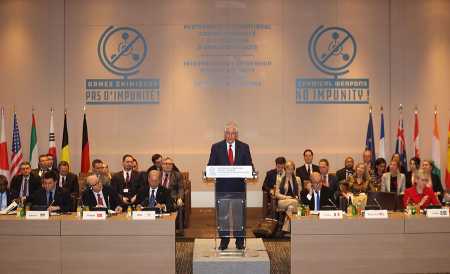"Though we have achieved progress, our work is not over. That is why I support the mission of the Arms Control Association. It is, quite simply, the most effective and important organization working in the field today."
New Group Challenges CW ‘Impunity’
March 2018
By Alicia Sanders-Zakre
France launched an initiative to counter the use and proliferation of chemical weapons amid a recent spike of chemical attacks in Syria. About 25 countries attended the Jan. 23 launch ceremony in Paris for the International Partnership Against Impunity for the Use of Chemical Weapons and agreed to implement its declaration of principles.
“This initiative puts those who ordered and carried out chemical weapons attacks on notice: You will face a day of reckoning for your crimes against humanity, and your victims will see justice done,” U.S. Secretary of State Rex Tillerson said in opening remarks.
 The partnership will facilitate information sharing, “name and shame” individuals and entities involved in chemical weapons attacks by publicizing their names on a website, and strengthen national accountability and enforcement efforts. France also imposed sanctions on individuals and entities linked to Syrian chemical weapons use.
The partnership will facilitate information sharing, “name and shame” individuals and entities involved in chemical weapons attacks by publicizing their names on a website, and strengthen national accountability and enforcement efforts. France also imposed sanctions on individuals and entities linked to Syrian chemical weapons use.
Although the partnership intends to address chemical weapons threats globally, the emphasis during the ceremony was on Syria. There were six chemical attacks in Syria from early January to early February, according to a U.S. State Department press release Feb. 5. The day before the partnership’s launch, there were reports of a chlorine gas attack killing an estimated 20 civilians in East Ghouta, a rebel-held Damascus suburb.
A report is forthcoming by a fact-finding mission investigating recent alleged chemical weapons attacks in Syria, Izumi Nakamitsu, UN high representative for disarmament affairs, told the Security Council on Feb. 5.
The new chemical weapons accountability initiative follows the breakdown late last year of a mechanism that identified chemical weapons users in Syria. In 2015 the Security Council adopted Resolution 2235, creating the Joint Investigative Mechanism (JIM), a collaborative effort between the United Nations and the Organisation for the Prohibition of Chemical Weapons (OPCW) tasked with determining the culpable actor for verified chemical weapons attacks in Syria.
The latest JIM report, in October 2017, found the Assad regime guilty of using sarin gas in an April 2017 attack and the Islamic State group responsible for using sulfur mustard in a September 2016 attack. The JIM’s mandate expired, and the body was forced to cease investigations in November 2017, after Russia blocked several attempts to extend the mandate and asserted that the JIM conclusions were inaccurate and politically biased. (See ACT, December 2017.)
In remarks at the launch ceremony, French Foreign Minister Jean-Yves Le Drian emphasized that the new group would not replace existing multilateral bodies, such as the JIM. Instead, the project would aim to “complement” their work by creating a “meaningful and operational instrument” in light of the obstructions encountered by existing bodies.
Although Russia was absent from the launch, U.S.-Russian animosity over chemical weapons use in Syria was not. In Paris, Tillerson chastised Moscow for shielding the Assad regime, asserting that “Russia ultimately bears responsibility for the victims in East Ghouta and countless other Syrians targeted with chemical weapons.”
In New York just hours after the launch ceremony, Vassily Nebenzia, Russian ambassador to the UN, called an impromptu Security Council meeting, where he rejected U.S. criticism, called the French initiative an attempt “to create an anti-Damascus bloc through the proliferation of lies,” and introduced a proposal to extend the JIM mandate. Nikki Haley, U.S. ambassador to the UN, dismissed the Russian proposal on the grounds that its terms were unacceptable and that it was intended as a distraction from the partnership launch.
France will chair the partnership this year, with plans to convene experts meetings to discuss progress on the implementation of the principles. Some experts have remarked on the uncertainty around the effort and the obstacles it may encounter to gain additional members.
The procedure for the partnership to determine its rules of operation are not yet clear. John Hart, head of the Chemical and Biological Security Project at the Stockholm International Peace Research Institute, wrote in a Feb. 8 article for the Lowy Institute that the partnership may have trouble reaching a “common understanding” between governments and civil society and among governments on the source and use of intelligence, as well as guidelines for the publication of information.
Hart observed that states may be unwilling to “become entangled” in a Russian-U.S. dispute or will lack the technical capacity to contribute intelligence to the partnership.
